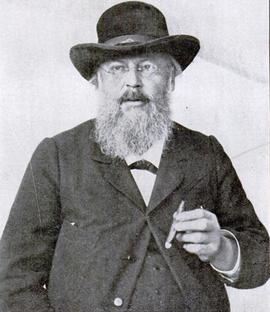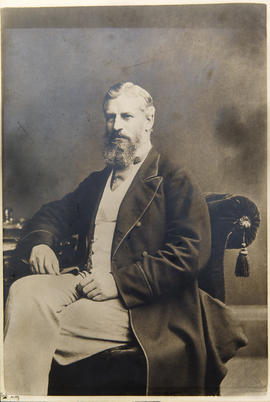Charles Culliford Boz Dickens, better known as Charles Dickens Jr., was the first child of the English novelist Charles Dickens and his wife Catherine. A failed businessman, he became the editor of his father's magazine All the Year Round, and a writer of dictionaries. He is now most remembered for his two 1879 books, Dicken's Dictionary of London and Dickens's Dictionary of the Thames
Felix Anton Dohrn was a prominent German Darwinist and the founder and first director of the first zoological research station in the world, the Stazione Zoologica in Naples, Italy.
Wynfrid Lawrence Henry Duckworth was a British anatomist and former Master of Jesus College Cambridge. The Duckworth Laboratory (Department of Biological Anthropology) at Cambridge University is named after him
Sir William Hart Dyke, 7th Baronet, was an English Conservative politician and tennis pioneer
Henry Charles Keith Petty-Fitzmaurice, 5th Marquess of Lansdowne, was a British statesman who served successively as Governor General of Canada, Viceroy of India, Secretary of State for War and Secretary of State for Foreign Affairs
Sir William Henry Flower was a surgeon, museum curator and comparative anatomist, who became a leading authority on mammals and especially on the primate brain. He supported Thomas Henry Huxley in a controversy with Richard Owen about the human brain and eventually succeeded Owen as Director of the Natural History Museum.
On the recommendation of Huxley and others, in 1862 he became Conservator of the Hunterian Museum of the Royal College of Surgeons of England, holding the post for 22 years, and in 1864 he was elected a Fellow of the Royal Society. In 1870 he became Hunterian Professor of Comparative Anatomy, in succession of Huxley, and began a series of lectures that ran for fourteen years, all on aspects of Mammalia. The essence was published in his books of 1870 and 1891. He was elected President of the Zoological Society of London in 1879, holding the post for life, and in 1882 was awarded the Royal Medal of the Royal Society. From 1883 to 1885 he was President of the Anthropological Institute.
In 1884, on the retirement of Sir Richard Owen, he was appointed to the directorship of what were then the Natural History departments of the British Museum in South Kensington. In 1889 he was chosen as President of the British Association for the Advancement of Science, having previously headed its biological section in 1878 and its anthropological section in 1881 (being chosen again in 1894). In 1893 he served as President of the Museums Association. In 1895, in addition to his role as Director he took over the post of Keeper of Zoology, holding it until his retirement.

